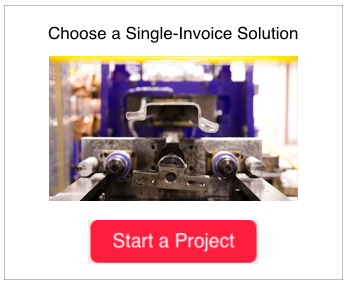 Tooling presents a significant upfront cost to new fabrication projects, and escalating tooling costs can hurt businesses’ bottom lines. As a result, tooling can be cost-prohibitive for many would-be roll formed products.
Tooling presents a significant upfront cost to new fabrication projects, and escalating tooling costs can hurt businesses’ bottom lines. As a result, tooling can be cost-prohibitive for many would-be roll formed products.
In response, some metal fabricators offer “free” or partially owned tooling. This allows manufacturers to reduce the upfront costs of roll forming, and free up cash flow.
But in the long-term, it’s not that simple.
These tooling arrangements have a hidden price that increases your total cost of ownership. Below, we outline why you should be wary of free tooling claims, and what you should do instead.
Problem #1: Partial ownership ties up capital.
Partial tooling ownership ties up capital on another shop’s floor. Much like a home mortgage, the tooling is not an owned asset until completely paid off. Until then, it’s nothing more than a sunk cost. Metal fabricators might also tack on fees to production to account for tooling die maintenance, repairs or replacement.
You often must pay off the balance or accrue a penalty to acquire the tooling. If you want to manufacture with another supplier or bring production in-house, anticipate these hidden expenses.
Related: Understand Your Total Cost of Ownership
Problem #2: “Free” tooling can be inefficient.
“Free” tooling allows manufacturers to utilize the suppliers’ existing tooling catalog. For standard profiles, this arrangement works well. However, roll forming excels at producing complex linear shapes and completing multiple operations in a single pass. Custom tooling is often necessary to fully utilize roll forming’s unique benefits, and eliminate the unnecessary cost of secondary processing operations.
Components that are optimized for roll forming can often be lighter and stronger. They require less assembly, and cut material, labor and shipping costs. Commoditized shapes can be produced efficiently with free roll form tooling, but custom-made dies create a true competitive advantage.
(Tip: Enjoy the best of both by supplementing custom tooling dies with standard roll formed shapes. Download them for free here.)
The Solution: Amortized Tooling
When it comes to free tooling, what looks like a sweet deal at the outset can quickly turn sour. The solution? Tooling cost amortization.
Hynes Industries believes that customers should maintain full ownership of their tooling. Owned, custom tooling dies reinforce the very benefits roll forming offers: a tailored fabrication solution and high volume, low cost-per-part production. We also believe in forming long-term partnerships with our customers; ones based on value and shared success.rig
Instead of free or partial tooling, Hynes partners with customers by offering favorable cost amortization terms. Our Tooling Amortization Program allows customers to amortize a project’s tooling costs over time and volume requirements. This allows them to benefit from full tooling ownership and reduced setup costs.
Interested? Learn more about tooling cost amortization.
To learn more about how we helped customers solve their fabrication problems, read our case studies.
Image Source: Andrew Magill via Flickr


